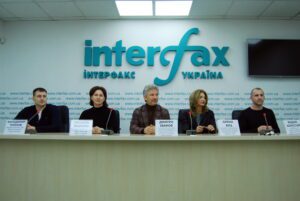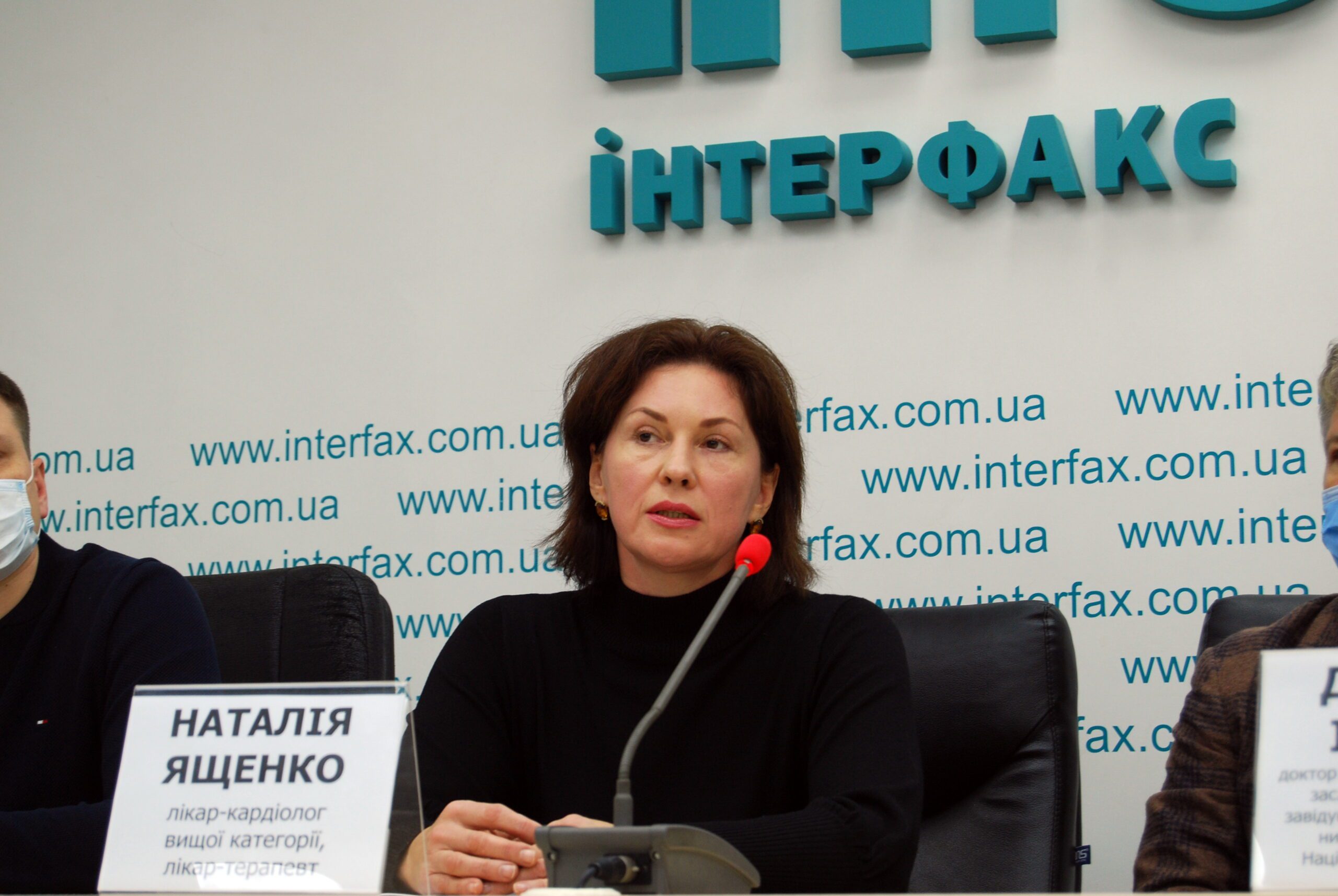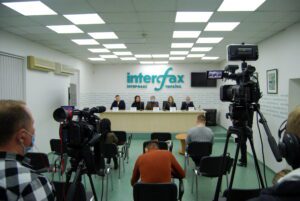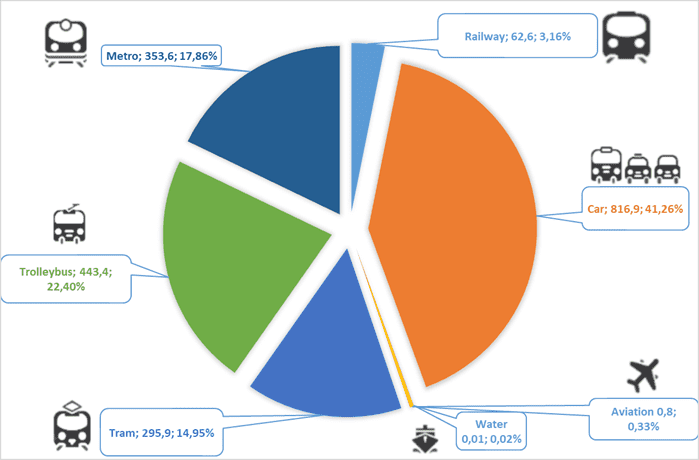
Some 5-7% of people who came through COVID-19 could have a post-COVID syndrome, this opinion was expressed by the head of the department of nephrology at the Shupyk National Healthcare University of Ukraine, Dmytro Ivanov, at a press conference at the Interfax-Ukraine agency.
“When we analyzed the mortality of people from COVID-19 and compared what concomitant diseases they had, it turned out that there were mainly five diseases. Three of them are kidney diseases. People with kidney transplants die first, and those with kidney failure second,” Ivanov said.

In turn, the head of the direction of rehabilitation of the network of Adonis medical clinics, Vadym Kerestey, noted that the main consequences of COVID-19 are expressed in the form of shortness of breath, decreased physical activity, decreased exercise tolerance, dizziness, loss of coordination and apathy.
“All these consequences require the help of a physical therapist,” Kerestey said.
Natalya Yaschenko, the Associate Professor of the Department of Cardiac Surgery at the National Healthcare University of Ukraine, the cardiologist of the highest category, emphasized the need for a mandatory medical examination after suffering COVID-19.
“If the COVID was symptom-free, then all patients should at least in two to four weeks undergo the blood counts, check the function of the kidneys, the liver, possibly the coagulation system. In addition, you should definitely do an electrocardiogram,” Yaschenko said.

In turn, obstetrician-gynecologist of the highest category Volodymyr Terekhov noted the need for vaccination against COVID-19.
“It is better to be vaccinated prematurely and be prepared for the virus to enter the body. Therefore, before pregnancy, you should definitely be vaccinated. You need to be vaccinated as early as possible,” Terekhov said.
At the same time, according to the psychologist, psychoanalyst Olena Buts, if a person has any fears after the illness, then he needs the help of a psychologist and psychoanalyst, since the person comes into a state of nervousness, phobia, fear. At the same time, she added that the presence of some kind of mental illness significantly worsens his condition.
BUTS, COVID-19, KERESTEY, SHUPYK, TEREKHOV, YASCHENKO, ИВАНОВ

Experts from various fields of medicine made recommendations to patients with COVID-19 during a press conference at the Interfax-Ukraine agency on Monday.
“First, try to be outdoors as much as possible, but on condition that the air temperature is not lower than -4 or -5 degrees. Second, try to do physical exercises, but mostly of an aerobic nature,” the head of the rehabilitation department of the Adonis network of medical clinics, Vadym Kerestey, recommends.

In addition, he commented on the currently popular recommendation for patients after COVID-19 to “inflate balloons.”
“It is categorically not recommended to inflate balloons. Training should be aimed not at exhalation, but at inhalation, in order to increase the vital capacity of the lungs and use as much lung tissue as possible to improve gas exchange,” Kerestey said.
In turn, the head of the department of nephrology of the Shupyk National Healthcare University of Ukraine, Dmytro Ivanov, recommended that patients after COVID-19 do basic diagnostic tests.
“Do a blood test, urine test, measure blood pressure after COVID-19. Assess whether you need a doctor at all in this situation, whether you feel comfortable, whether you need any help,” he said.
Natalya Yaschenko, the Associate Professor of the Department of Cardiac Surgery of the National Healthcare University of Ukraine, a cardiologist of the highest category, recommended physical, metered loads, control of blood pressure and eating behavior to those who had undergone COVID-19. At the same time, she emphasized that the reason for timely medical assistance can be an acute deterioration in the form of an increase or decrease in blood pressure, an increase or decrease in heart rate, progressive chest pain that does not decrease for several hours.

The obstetrician-gynecologist of the highest category, Volodymyr Terekhov, in turn, drew attention to the fact that “one of the signs of recovery for married couples is the desire to have a child.”
“If a married couple wants to fulfill their duty and give birth to a child, then this is an indicator that speaks of their recovery. To realize a basic function or reproduce – it is very important to do this after rehabilitation,” Terekhov said.
At the same time, the psychologist, psychoanalyst Olena Buts recommends dietology to patients: minerals, vitamins, coenzymes – what, according to her, increases immunity and brings happiness.
BUTS, COVID, COVID-19, INFLATE BALLOONS, KERESTEY, TEREKHOV, YASCHENKO, ИВАНОВ

Westinghouse (the United States) and National Nuclear Generating Company Energoatom have signed two cooperation agreements providing for the start of projects for the construction of two new reactors at Khmelnytsky NPP using AP1000 technology.The documents were signed during the international conference Atomic Opportunities for National Development on Monday in Kyiv.As an Interfax-Ukraine correspondent reported, one of the agreements provides for the purchase of services from the U.S. company for the design of reactors, the other for the purchase of a simulator and equipment with a long service life.According to Petro Kotin, Acting President of Energoatom, the purchase of the simulator in advance will make it possible to train personnel long before the reactors are put into operation.”AR 1000 is a new technology for us. Right now we need to start training inspectors so that they can then start training personnel. We don’t want to waste time on this later, so we buy the simulator first of all,” Kotin said.In addition, the agreement provides for advance financing of equipment that has a long manufacturing cycle.”This is done in order not to delay construction. Some equipment has been manufactured for about three years,” the head of Energoatom explained.Kotin added that the agreements with Westinghouse also provide for the preparation of pilot projects for the construction of reactors, in particular, the preparation of infrastructure and testing of the site where they will be located.In turn, as Minister of Energy Herman Haluschenko said, the agreements signed with Westinghouse are extremely important, since the AP 1000 reactors are unlicensed in Ukraine.”I would not like the licensing issue to drag on. And this is a huge work, it is necessary to process a colossal array of documents. Therefore, we do everything as quickly as possible. And we received assurances from the U.S. side of their as much as possible assistance,” Haluschenko said.As reported, within the framework of the September visit of the President of Ukraine to the United States, Energoatom and U.S. Westinghouse Electric signed a memorandum on the construction of a total of five reactors in Ukraine. The cost of the project will be about $25 billion.

The hotel operator Ribas Hotels Group (Odesa) is launching a franchise program for the development of a chain of apart-hotels by Ribas in partnership with developers.
“As part of the partnership, the Ribas Hotels chain transfers all its technical standards and design projects to development companies, accompanies their design and construction departments and strengthens the marketing and sales department,” Ribas Hotels Group told Interfax-Ukraine.
According to the terms of the partnership, after commissioning, the hotel is transferred to the management of the Ribas Hotels Group. The sale of apartments is carried out during the construction of the object. The profitability from operating activities of hotels is estimated at 8-20% per annum.
According to the operator, the first apart-hotel of the WOL sub-brand, which will be further sold under a franchise, will open at 121 Fontanska Road Street in Odesa in February 2022.
According to Ribas, in 2022 the chain will be replenished with two more apart-hotels in Odesa and Lviv. At the same time, the company has not yet disclosed developer partners in these projects.
“Taking into account the market demand, the hotel operator plans to create only ten investment projects of apart-hotels in different regions of Ukraine,” Ribas Hotels Group said.
Ribas Hotels Group cooperates (management, franchising and booking) with 25 objects of the hotel and restaurant complex (city, beach and ski hotels). The company’s portfolio includes the business hotels Wall Street by Ribas and Bossfor by Ribas (Odesa), the ski hotel Ribas Karpaty (Bukovel, Ivano-Frankivsk region), the beach complex Richard by Ribas (Hrybovka, Odesa region). Hotels in Lviv, Kyiv, Odesa, and also in Poland are currently at the design and construction stage.
The total number of rooms in the network exceeds 1,000 in various forms of cooperation in eight cities and resort locations of Ukraine.
Ribas Hotels Group LLC was established in 2017. According to the data of the unified state register of legal entities and individual entrepreneurs, Artur Lupashko is the head and owner of a 100% share in the charter capital of the company.

Public associations of farmers are asking the government to consider the possibility of providing chemical enterprises with a commodity loan for 1.25 billion cubic meters of natural gas for the production of mineral fertilizers, this will avoid a shortage of fertilizers and “unrestrained price increases” for them next spring.The corresponding appeal of the Ukrainian Agribusiness Club (UAC), the Agrarian Union of Ukraine, the Federation of Employers, the Union of Chemists of Ukraine, the Ukrainian League of Industrialists and Entrepreneurs, the Council of Entrepreneurs under the Cabinet of Ministers of Ukraine, the Ukrainian Agri Council and the Ukrainian Agrarian confederation to Prime Minister Denys Shmyhal was published on the UAC’s website.As stated in the appeal, over the past month, most of the major European producers of nitrogen mineral fertilizers have reduced production due to a sharp rise in prices for natural gas, which leads to a shortage of mineral fertilizers in the European and world markets.According to UAC, Ukraine meets the needs for mineral fertilizers mainly due to domestic production, while in order to provide the country’s sowing campaign, 2.3 million tonnes of fertilizers are needed for the period of November 2021-May 2022, of which 75% is expected from domestic production and 25% – from import supplies.In such conditions, an important component of providing Ukrainian farmers with nitrogen fertilizers is the stable and uninterrupted operation of domestic producers, primarily in the winter period, when their stock is formed for the spring sowing campaign and feeding winter crops. In turn, this can be achieved only if there is a necessary supply of natural gas, the main raw material for the chemical industry at a stable price.The associations in their appeal suggested that the government consider the possibility of allocating a commodity loan for 1.25 billion cubic meters of natural gas to domestic producers of nitrogen fertilizers for the period from November 2021 to April 2022 at the expense of the reserves of NJSC Naftogaz Ukrainy.
Passengers carried in Jan-August of 2021, in mln
